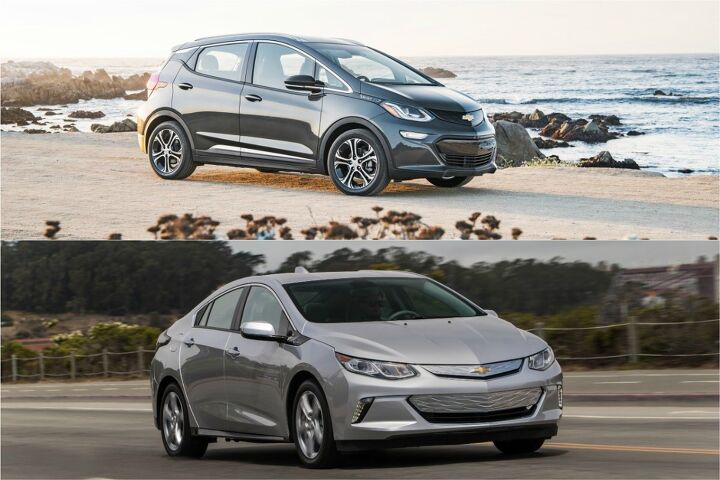The Chevrolet Bolt Is Now Far More Popular Than the Chevrolet Volt
If plug-in hybrids were meant to function as a stop-gap between ICE-powered cars and fully electric cars, it may be time to consider Chevrolet gapless.
The Chevrolet Volt appeared in first-gen form in late 2010. By 2016, with the arrival of a second-generation edition, Volt sales climbed to record levels in the United States, albeit still not at the level GM originally hoped to see.
The Volt was and is a plug-in hybrid, an electric car with a range-extending gas-powered engine.
But with nationwide availability of the Chevrolet Bolt — change that V to a B for pure electricity — we’re now watching as Chevrolet Volt sales tumble. It turns out General Motors now has far more U.S. demand for its electric car than its ICE-accompanying electric car.
We noticed this switch first in July. Volt sales had risen 12 percent beyond 2016’s record high through the first-half of 2017, but then July’s Volt volume plunged 37 percent to only 1,518 units, a 17-month low.
July marked the first occasion in which the Bolt outsold the Volt, boosted by greater availability across much of America. With nationwide availability in August, Bolt sales increased further, rising to 2,107 units while Volt volume took another big hit. August Volt sales were down 31 percent, year-over-year, to 1,445 units.
September cemented the trend, however. Volt volume continued to crumble, sliding 29 percent to 1,453 sales, while the Bolt jumped to its highest monthly total since arriving at dealers last December. General Motors reported 2,632 U.S. Bolt sales in America in September, or 81-percent more Bolts than Volts.
With rising Bolt sales and sliding Volt sales come rising Volt inventories. Heading into September, Automotive News said GM had a 97-day supply of Volts, or roughly 5,200 cars. According to Cars.com, there are still over 5,000 Volts in stock at U.S. dealers. That’s about 9-percent more inventory than the Bolt for a car that’s now selling far less often.
The Bolt, of course, is only one of the Volt’s issues. At this point in 2016 Toyota was still in between Prius plug-ins. With the Prius Prime fully onstream now, Chevrolet is also about to lose its plug-in hybrid sales crown, as well. The Volt outsold the Prius Prime by more than 1,200 units in the first-half of 2017 but in Q3 trailed the Toyota by nearly 1,000 sales.
[Images: GM; Chart: The Truth About Cars]
Timothy Cain is a contributing analyst at The Truth About Cars and Autofocus.ca and the founder and former editor of GoodCarBadCar.net. Follow on Twitter @timcaincars and Instagram.
More by Timothy Cain
Latest Car Reviews
Read moreLatest Product Reviews
Read moreRecent Comments
- Kjhkjlhkjhkljh kljhjkhjklhkjh [h3]Wake me up when it is a 1989 635Csi with a M88/3[/h3]
- BrandX "I can charge using the 240V outlets, sure, but it’s slow."No it's not. That's what all home chargers use - 240V.
- Jalop1991 does the odometer represent itself in an analog fashion? Will the numbers roll slowly and stop wherever, or do they just blink to the next number like any old boring modern car?
- MaintenanceCosts E34 535i may be, for my money, the most desirable BMW ever built. (It's either it or the E34 M5.) Skeptical of these mods but they might be worth undoing.
- Arthur Dailey What a load of cow patties from fat cat politicians, swilling at the trough of their rich backers. Business is all for `free markets` when it benefits them. But are very quick to hold their hands out for government tax credits, tax breaks or government contracts. And business executives are unwilling to limit their power over their workers. Business executives are trained to `divide and conquer` by pitting workers against each other for raises or promotions. As for the fat cat politicians what about legislating a living wage, so workers don't have to worry about holding down multiple jobs or begging for raises? And what about actually criminally charging those who hire people who are not legally illegible to work? Remember that it is business interests who regularly lobby for greater immigration. If you are a good and fair employer, your workers will never feel the need to speak to a union. And if you are not a good employer, then hopefully 'you get the union that you deserve'.
































Comments
Join the conversation
Neither are big sellers. GM has been advertising the Bolt with nothing for the Volt. Personally, I would not own a Bolt unless it were at least just a 2nd car or 3rd car. In other words, a commuter car toy. I own a Volt and enjoy using it as a commuter car for work with zero anxiety about running out of battery power. Unlike the Bolt, I can drive anywhere in the US or Canada with a car that handles really well and has good acceleration (especially on Sport mode). The downside is that the Volt is small with the Bolt only a little bigger. I've driven the Volt for 4 years with zero problems. I get 45 miles in the summer and 35 in the winter on battery, which then can switch seamlessly to gasoline, if needed. The new ones are over 60 miles. I have friends who have run into the limit on a Bolt - "I can't go with you guys tonight, I'd never make it home". When 15 minute/ 100 miles charging stations are everywhere, then all electric will be great.
Do people really want to sit around for 15 minutes to get their 50 miles of charge? What, then they go somewhere, maybe home and charge up a second time? The serial plug-in hybrid (all-electric until generator needed) is brilliant because the ICE generator lets you fill up as fast as any ICE-only car, but if you rarely use the engine, it gets very little wear and tear. I once heard about an "instant battery pack" concept for all-electric cars, and THAT would give you an instant full charge, but until then I'm sticking with a serial hybrid. The 2012 Volt was by far the best, jammed full of electronics features (DVD, audio hard-drive, superior navigation software) that were stripped from 2013 on. I'm now on my second (2015) Volt, which in spite of the crappy navigation and entertainment features still drives great and still has the cool touch controls. Bottom line: Until another American made car can beat the Volt for price, range and quick (complete) fill-up, it's my choice.